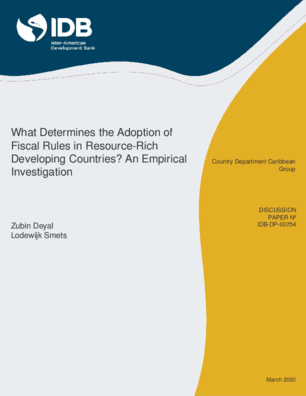What Determines the Adoption of Fiscal Rules in Resource-Rich Developing Countries?: An Empirical Investigation
Date
Mar 2020
Over the past three decades, fiscal rules have increasingly been used as a tool to promote fiscal responsibility and macroeconomic stability. In principle, fiscal rules have numerous benefits, especially for resource-rich economies. Many countries, however, still opt to leave fiscal policy unconstrained. This paper investigates the reasons for this by determining the economic, institutional, and political factors which influence the likelihood that a country will adopt a fiscal rule. It focuses on resource-rich countries and accounts for the role of development agencies. Results from a conditional fixed-effects logit model indicate that strong macroeconomic fundamentals and government stability are associated with the adoption of a fiscal rule. Furthermore, the evidence shows that the presence of more development partnersespecially multilateral agenciesincreases the likelihood of adoption, even when controlling for the volume of aid and the presence of an IMF program. Generally, these results are robust to the use of different estimation techniques, an alternative measure for commodity dependence, and a restriction on the estimation sample.




